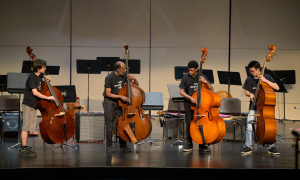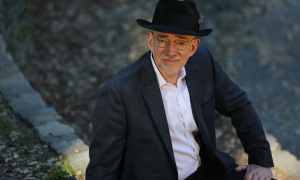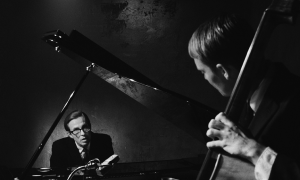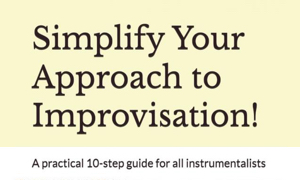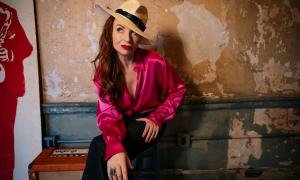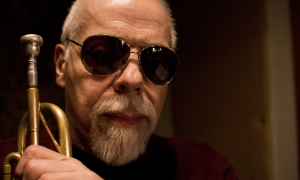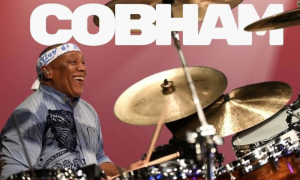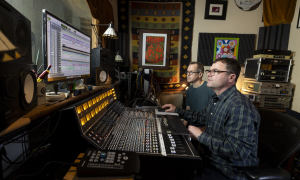By Dennis Cook
When most bands hit their 40th anniversary they make a big deal about it, issuing grand statements, box sets and generally making sure folks take note. Not so with The Doobie Brothers, who hit the four decade mark this year and have chosen to focus on their first new studio album in 10 years, a European tour, festival appearances and their usual steady gigging around the States. Today's Doobies—original members Tom Johnston (vocals, guitar) and Pat Simmons (vocals, guitar) and John McFee (guitars, various stringed things) and longtime drummer Michael Hossack—are more excited than ever to be doing their thing.
“This is just another year," chuckles Simmons. “[Anniversaries] are often a marketing ploy for a publicist or something. We're not interested in that."
“I can't remember half of the 40 years!" exclaims Johnston. “I'll tell you one thing I have noticed is the band's gotten better with time. Our live show's improved vastly—everybody's better on their instrument and people take the trouble to practice at home and work on their voices. I think our live show now is better than it's ever been. Another big plus is the guys in the band today. John adds so many musical ideas we'd never have come up with previously. He adds whole new dimensions to the band—slide, violin, fingerpicking, any number of things. I get comments after our shows, where people say, 'It looks like you guys are having a blast up there!' We are. We love getting people rollin' and rockin.'"
There's a serious blue-collar ethic to the Brothers, where sweat, roadwork and genuine craftsmanship seriously matter. Each chapter in their history has been earned through honest labor, which imbues their music with something rich and real. After 40 years, it'd be easy enough to not put their shoulders into what they do, but that wouldn't be the Doobie way.
“I never think about the number of years we've been together. What's important is where you're at, right here, right now. If somebody asks me what my favorite song is I say, 'The one I'm working on right now.' Everything else is already done," says Johnston. “The most important thing is to move forward. I don't think this band has ever tried to take the easy way out. We've always been proud of what we do, but we don't sit around talking about it. We're always chipping away at it, trying to make music that sounds good."
And their new album, World Gone Crazy (released independently September 28 on HOR Records), is one of the strongest installments in a catalogue that stretches 13 studio albums deep. The record includes cameos from former Doobie Michael McDonald, Willie Nelson and Little Feat's Bill Payne, but it's the quality songwriting and ageless voices of Simmons and Johnston that ring out most loudly. World Gone Crazy is a fine mixture of familiar Doobies textures but it's also unmistakably the sound of the band moving forward, trying fresh things, stretching themselves.
“I think we weren't trying to copy ourselves or anything, but I think we knew it should sound like a Doobie Brothers record. We always just go in with the goal of making the best record we can but not this type or that type of record," says Simmons. “We wanted to go a little further on this record than on some earlier records because we didn't have a record company breathing down our necks. We did it with some independent funding and we're pretty excited about it. People are responding very appropriately to the new tracks in concert. They don't go crazy like with 'China Grove,' but they're listening really attentively and clapping along. And the reaction to the new songs after we play a show has been really strong."
“It's not a rubberstamp version of a Doobie Brothers album, but it's like a Doobie Brothers album because we have no limits. We took advantage of that and went some places we've never been before. I'm enjoying this album more than anything we've done in a long time," says Johnston. “I've always looked at our music this way—and maybe it's an oversimplification—we're basically an American band. We play stuff from all genres of American music—R&B, blues, rock 'n' roll, things that are sort of country, some things that are almost bluegrass. We cover a lot of areas and this [new] album is a good example of that. This album's definitely got some different stuff on it, but when people hear it they'll know who it is."
McDonald's guest turn on “Don't Say Goodbye" is one of the new album's standouts.
“Mike is such a consummate artist, and when I was working on the track I thought he'd be perfect. When he came in, it was so effortless. He knew exactly what I wanted. He brought his own viewpoint on the melody and the cadence and where to put the accents. He just nailed it," says Simmons. “When I started working on that track I felt it had a Steely Dan kind of vibe, and I thought how much I'd love to hear Mike's voice with a lady's voice like on 'Peg' and 'Aja.' So I asked his wife [Amy Holland-McDonald] to come in and sing with him to create that effect. I told him straight out, 'I'd like it to sound like the stuff you did for Donald and Walter.' I also had Gail Swanson at the session, whose just great, and I had the two ladies sing with Mike, and they found the sound I'd been searching for."
World Gone Crazy reunites the band with producer Ted Templeman, who helmed the majority of the group's amazing run of 1970s releases.
“Ted's most important contribution was picking the tunes. We didn't have a producer on our previous album, Sibling Rivalry (2000), and I wasn't comfortable doing that. With four different singers and songs going everywhere, it's a challenge. With [World Gone Crazy], I sat down in my studio with Ted with about 70 songs on my hard drive and he helped find the right ones," says Johnston. “This album took about three years to make, which normally might not be a good thing but it gave me the chance to finish some songs I was ready to throw away, including 'A Brighter Day' [the album's lush, inviting opener]. I called Billy Payne to come play keyboards on a couple songs. In three days, he lifted ['A Brighter Day'] to a place it'd never been before, just utterly changed it and it became what I had in mind. I was just dancing around, and I did the same thing with 'World Gone Crazy,' where he played the piano the way I wanted to hear it, which was New Orleans style. He took it where it needed to go, and he did the same thing on 'Young Man's Game.' I love his playing on anything and he's such a great guy."
One of the only nods to their 40th anniversary is the remake of “Nobody," which originally appeared as the first cut on the Doobie Brothers' self-titled debut in 1970.
“It's definitely an upgrade. Nobody was that excited about doing it. It was the first thing we ever put out and it's 40 years old. I told them, 'It never got a fair shot. We have to redo it.' On the new version we took the motor out, took the wheels off, and put in a different drum style, different bass—which is Bob Glaub, who plays on the whole album except for one song. I asked John to play a chunka-chunka guitar part over the top, and that made a big difference. And there's an intro that was never there before. It has a groove, and it never really used to," says Johnston. “By the time we got it done, everybody was pretty stoked with it."
The new “Nobody" also spotlights one of the Doobie Brothers' enduring strengths—their harmonies. The Doobies still do it the old fashioned way, unlike the majority of auto-tuned and tweaked vocals today.
“I hate that. I don't believe in that or people doing shows where they lip-sync and don't really sing. There's a whole lot of stuff going on today that just annoys me. You're just rippin' the people off. You're not giving them a real show when you do that. The same thing can said about auto-tune," says Johnston. “We just do it the way we've always done it—sing it till you get it right or be happy with what you did get. What you hear on our albums is the way it was."
Continue reading for Pat Simmons' remembrances of the band's early days in the Bay Area and more...
Cities By The Bay
In many respects, The Doobie Brothers are a quintessential S.F. Bay Area band. Though based south of the big city in their early days, they embody all the same open-minded, gutsy energy that fueled their San Fran counterparts. I asked Pat Simmons what impact being from this area has had on the band.
“It's been huge. There's been so much music through the years out of the Bay Area. Even though we've had members living all over the place, we like to think of ourselves as a Bay Area band. It's where we were founded, and I cut my teeth on music there. I grew up in San Jose and Tom was a Central Valley guy but as soon as he graduated from high school he moved to the Bay Area to go to college. We were right there during the Summer of Love [laughs knowingly]. We were the ones at the Fillmore Auditorium freaking out while the Grateful Dead played. It's warped us to no end," says Simmons. “We loved Moby Grape, Jefferson Airplane, Mike Bloomfield and Electric Flag, and all the music that was coming through here, the blues legends like Freddie and Albert King and John Lee Hooker."
“We played with John Lee tons because we used to play a club in downtown San Francisco called The Keystone," continues Simmons. “Elvin Bishop had this open-mic thing he ran on Monday nights and every weekend they had special guests, often big names in the blues in those days and some jazz players. We ended up in probably 1970 opening all these shows for John Lee there. It was a great thing for us, and it was a nice show for the audience. Nobody knew who were but we were playing pretty good. And before the night was over, he'd invite us up to jam. For weeks and weeks, we'd go in and open for John Lee Hooker, who was just amazing."
“We did the same sort of thing over in North Beach at this place called the North Beach Revival, and that was more Latin bands. Neal Schon (Journey) had a band at the time before he joined Santana with a bunch of other Latin guys. It was Luis Gasca & Friends, which had a horn section, Neal on guitar, David Brown from Santana on bass and whoever else was around like Coke Escovedo. And again, we'd open the show for those guys with about 40 minutes and they'd finish the night. Then it got to be where we were the headliner there," says Simmons. “They were only a few places like that around town where it was casual enough that when musicians came in they didn't feel funny about sitting in. We were always getting guitar players. Johnny Winter would come in and ask to sit in and play the blues with us. Pete Townshend came in and sat in with us one night. You can't do that at the Great American Music Hall or Fillmore. It's less casual than when you play clubs."
This mix of slots—a blues session and a gig opening for Latin rockers—is indicative of the free-roaming yet grounded nature of the Doobie Brothers' music, whose sound very much evolved from these street level, dirt-under-the-nails live performances and then formally shaped into a studio sound that incorporated all these varied elements.
“I don't know that we've ever compromised the music. If we were playing a blues place, sure, we played the blues but everything we played wasn't the blues. We also played a lot of rock 'n' roll, which was different for the blues audiences. In some ways, people liked it because they knew they were going to hear some blues later, so why not some rock 'n' roll first? That enabled us to bridge a wide variety of music," says Simmons.
In some ways this diversity speaks to the Doobies' character as sophisticated hippies.
“I think you got the hippie part right but I'm not sure about the sophisticated part [laughs]. When Mike [McDonald] joined the band everything changed. The opportunities to try things we'd never done before opened up," says Simmons. “We did some odd stuff early on, but if we were stretching out it was more like Loggins & Messina or the Allman Brothers, where later on with Mike—and I almost hate to say this—we did some almost Frank Zappa-esque stuff. That was kind of 'oops' and my fault really. It wasn't Mike's idea so don't blame him."
“It enabled me to do some stuff that I really wanted to try, and unfortunately I had Jeff Baxter to egg me on! He and I were kinda crazy guitarist nuts. Jeff was pretty cutting edge at the time, getting into guitar synthesizers. And coming out of Steely Dan, he identified a bit with bebop. I think we were able to come together in our love of Zappa," continues Simmons. “Mike also brought a fusion edge to things. He's kind of a cool jazz guy, and I think he really admired Ray Charles and brought that in for all of us to key off of. And also coming from Steely Dan, he admired what Donald Fagen was doing and brought elements of that into things. It certainly enabled us to go a little further, though we probably weren't the sophisticates we thought we were [laughs]."
Rockin' Down The Highway
The main priority for the Doobies right now is getting folks to listen to an album they're justifiably proud of, and of course, continuing to play music in front of audiences anywhere they can.
“We change up the setlists regularly. Of course, you have to play the chestnuts because the response is always positive and good. But, for instance, when we played Wolf Trap we worked up a full acoustic set that utilized deep album cuts like 'Rainy Day Crossroad Blues' and 'Snake Man,'" says Johnston. “Right now, it's pure energy from end-to-end, no ballads, which a few people have complained about."
While their live shows lean heavily on hits and longstanding audience favorites, the Doobie Brothers have a huge catalog full of great tunes that might be less familiar to casual listeners but are terrific nonetheless. For hardcore followers, the chance to hear gems “Clear As The Driven Snow," “Song To See You Through," “White Sun" or a primo instrumental like “Steamer Lane Breakdown" would be a dream come true. And Simmons confirms that we're not the only ones dreaming along these lines.
“We're very conscious of the need to entertain the people that come to see us, but I'm always interested in going further. I want people to cry," says Simmons with resounding sincerity. “We need to revisit our b-sides and album tracks more in the future. I'm only speaking for myself, but I'd like to be able to play [new song] 'Far From Home' because I think it's different. The song means a lot to me and I love the way it came out. So, songs like that I'd like to be able to perform, but it requires people sitting and listening and not jumping around and clapping. Everyone has to be prepared for that in the band, and that's part of my job to prepare them."
“When you get in your stride, there's nothing you can't do. But, when you're doing things like that it's taking a chance. It's being ready to step out and be a little self-conscious," continues Simmons. “There are people in our band with social phobias. They feel a little uncomfortable in crowds and they get a little tongue-tied when they get on a microphone and have to be extemporaneous. You have to be able to do that sort of stuff in order [to play quieter, more listener-attentive material]. It'll be a challenge but one I'm interested in pursuing."
So, with the younger generation perhaps unaware of the cultural basis of the word doobie, what does it mean to the guys in this band to be a Doobie Brother in 2010?
“It means the same thing to me it always did [laughs]. As a band name, it was kind of an accident," says Simmons. “The very first thing on the DVD in the Deluxe version of World Gone Crazy sort of answers the question of our name pretty well."
“It's always just been a name, not a moniker of our lifestyle or anything," says Johnston. “We didn't have a name and nobody in the band came up with that name. A guy that lived in the house I was in on 12th St. in San Jose came up with the name. We were going to a gig and needed a name, and he said, 'Why don't you call yourselves the Doobie Brothers?' And it stuck around [laughs]."
“We just feel we're fortunate to be able to do what we do," says Simmons. “I can't say enough about how lucky we've been. We love music SO much. Everybody in this band loves to play. Through the years, people have come and gone, and this particular group of guys [now] is so deep into playing, writing and recording. It's still our hobby and our job. Getting onstage is the best part of our day when we're traveling around. No matter what else you've gone through that day, when you get on that stage it's, 'Whooo, finally, we made it!'"
When most bands hit their 40th anniversary they make a big deal about it, issuing grand statements, box sets and generally making sure folks take note. Not so with The Doobie Brothers, who hit the four decade mark this year and have chosen to focus on their first new studio album in 10 years, a European tour, festival appearances and their usual steady gigging around the States. Today's Doobies—original members Tom Johnston (vocals, guitar) and Pat Simmons (vocals, guitar) and John McFee (guitars, various stringed things) and longtime drummer Michael Hossack—are more excited than ever to be doing their thing.
“This is just another year," chuckles Simmons. “[Anniversaries] are often a marketing ploy for a publicist or something. We're not interested in that."
“I can't remember half of the 40 years!" exclaims Johnston. “I'll tell you one thing I have noticed is the band's gotten better with time. Our live show's improved vastly—everybody's better on their instrument and people take the trouble to practice at home and work on their voices. I think our live show now is better than it's ever been. Another big plus is the guys in the band today. John adds so many musical ideas we'd never have come up with previously. He adds whole new dimensions to the band—slide, violin, fingerpicking, any number of things. I get comments after our shows, where people say, 'It looks like you guys are having a blast up there!' We are. We love getting people rollin' and rockin.'"
There's a serious blue-collar ethic to the Brothers, where sweat, roadwork and genuine craftsmanship seriously matter. Each chapter in their history has been earned through honest labor, which imbues their music with something rich and real. After 40 years, it'd be easy enough to not put their shoulders into what they do, but that wouldn't be the Doobie way.
“I never think about the number of years we've been together. What's important is where you're at, right here, right now. If somebody asks me what my favorite song is I say, 'The one I'm working on right now.' Everything else is already done," says Johnston. “The most important thing is to move forward. I don't think this band has ever tried to take the easy way out. We've always been proud of what we do, but we don't sit around talking about it. We're always chipping away at it, trying to make music that sounds good."
And their new album, World Gone Crazy (released independently September 28 on HOR Records), is one of the strongest installments in a catalogue that stretches 13 studio albums deep. The record includes cameos from former Doobie Michael McDonald, Willie Nelson and Little Feat's Bill Payne, but it's the quality songwriting and ageless voices of Simmons and Johnston that ring out most loudly. World Gone Crazy is a fine mixture of familiar Doobies textures but it's also unmistakably the sound of the band moving forward, trying fresh things, stretching themselves.
“I think we weren't trying to copy ourselves or anything, but I think we knew it should sound like a Doobie Brothers record. We always just go in with the goal of making the best record we can but not this type or that type of record," says Simmons. “We wanted to go a little further on this record than on some earlier records because we didn't have a record company breathing down our necks. We did it with some independent funding and we're pretty excited about it. People are responding very appropriately to the new tracks in concert. They don't go crazy like with 'China Grove,' but they're listening really attentively and clapping along. And the reaction to the new songs after we play a show has been really strong."
“It's not a rubberstamp version of a Doobie Brothers album, but it's like a Doobie Brothers album because we have no limits. We took advantage of that and went some places we've never been before. I'm enjoying this album more than anything we've done in a long time," says Johnston. “I've always looked at our music this way—and maybe it's an oversimplification—we're basically an American band. We play stuff from all genres of American music—R&B, blues, rock 'n' roll, things that are sort of country, some things that are almost bluegrass. We cover a lot of areas and this [new] album is a good example of that. This album's definitely got some different stuff on it, but when people hear it they'll know who it is."
McDonald's guest turn on “Don't Say Goodbye" is one of the new album's standouts.
“Mike is such a consummate artist, and when I was working on the track I thought he'd be perfect. When he came in, it was so effortless. He knew exactly what I wanted. He brought his own viewpoint on the melody and the cadence and where to put the accents. He just nailed it," says Simmons. “When I started working on that track I felt it had a Steely Dan kind of vibe, and I thought how much I'd love to hear Mike's voice with a lady's voice like on 'Peg' and 'Aja.' So I asked his wife [Amy Holland-McDonald] to come in and sing with him to create that effect. I told him straight out, 'I'd like it to sound like the stuff you did for Donald and Walter.' I also had Gail Swanson at the session, whose just great, and I had the two ladies sing with Mike, and they found the sound I'd been searching for."
World Gone Crazy reunites the band with producer Ted Templeman, who helmed the majority of the group's amazing run of 1970s releases.
“Ted's most important contribution was picking the tunes. We didn't have a producer on our previous album, Sibling Rivalry (2000), and I wasn't comfortable doing that. With four different singers and songs going everywhere, it's a challenge. With [World Gone Crazy], I sat down in my studio with Ted with about 70 songs on my hard drive and he helped find the right ones," says Johnston. “This album took about three years to make, which normally might not be a good thing but it gave me the chance to finish some songs I was ready to throw away, including 'A Brighter Day' [the album's lush, inviting opener]. I called Billy Payne to come play keyboards on a couple songs. In three days, he lifted ['A Brighter Day'] to a place it'd never been before, just utterly changed it and it became what I had in mind. I was just dancing around, and I did the same thing with 'World Gone Crazy,' where he played the piano the way I wanted to hear it, which was New Orleans style. He took it where it needed to go, and he did the same thing on 'Young Man's Game.' I love his playing on anything and he's such a great guy."
One of the only nods to their 40th anniversary is the remake of “Nobody," which originally appeared as the first cut on the Doobie Brothers' self-titled debut in 1970.
“It's definitely an upgrade. Nobody was that excited about doing it. It was the first thing we ever put out and it's 40 years old. I told them, 'It never got a fair shot. We have to redo it.' On the new version we took the motor out, took the wheels off, and put in a different drum style, different bass—which is Bob Glaub, who plays on the whole album except for one song. I asked John to play a chunka-chunka guitar part over the top, and that made a big difference. And there's an intro that was never there before. It has a groove, and it never really used to," says Johnston. “By the time we got it done, everybody was pretty stoked with it."
The new “Nobody" also spotlights one of the Doobie Brothers' enduring strengths—their harmonies. The Doobies still do it the old fashioned way, unlike the majority of auto-tuned and tweaked vocals today.
“I hate that. I don't believe in that or people doing shows where they lip-sync and don't really sing. There's a whole lot of stuff going on today that just annoys me. You're just rippin' the people off. You're not giving them a real show when you do that. The same thing can said about auto-tune," says Johnston. “We just do it the way we've always done it—sing it till you get it right or be happy with what you did get. What you hear on our albums is the way it was."
Continue reading for Pat Simmons' remembrances of the band's early days in the Bay Area and more...
Cities By The Bay
In many respects, The Doobie Brothers are a quintessential S.F. Bay Area band. Though based south of the big city in their early days, they embody all the same open-minded, gutsy energy that fueled their San Fran counterparts. I asked Pat Simmons what impact being from this area has had on the band.
“It's been huge. There's been so much music through the years out of the Bay Area. Even though we've had members living all over the place, we like to think of ourselves as a Bay Area band. It's where we were founded, and I cut my teeth on music there. I grew up in San Jose and Tom was a Central Valley guy but as soon as he graduated from high school he moved to the Bay Area to go to college. We were right there during the Summer of Love [laughs knowingly]. We were the ones at the Fillmore Auditorium freaking out while the Grateful Dead played. It's warped us to no end," says Simmons. “We loved Moby Grape, Jefferson Airplane, Mike Bloomfield and Electric Flag, and all the music that was coming through here, the blues legends like Freddie and Albert King and John Lee Hooker."
“We played with John Lee tons because we used to play a club in downtown San Francisco called The Keystone," continues Simmons. “Elvin Bishop had this open-mic thing he ran on Monday nights and every weekend they had special guests, often big names in the blues in those days and some jazz players. We ended up in probably 1970 opening all these shows for John Lee there. It was a great thing for us, and it was a nice show for the audience. Nobody knew who were but we were playing pretty good. And before the night was over, he'd invite us up to jam. For weeks and weeks, we'd go in and open for John Lee Hooker, who was just amazing."
“We did the same sort of thing over in North Beach at this place called the North Beach Revival, and that was more Latin bands. Neal Schon (Journey) had a band at the time before he joined Santana with a bunch of other Latin guys. It was Luis Gasca & Friends, which had a horn section, Neal on guitar, David Brown from Santana on bass and whoever else was around like Coke Escovedo. And again, we'd open the show for those guys with about 40 minutes and they'd finish the night. Then it got to be where we were the headliner there," says Simmons. “They were only a few places like that around town where it was casual enough that when musicians came in they didn't feel funny about sitting in. We were always getting guitar players. Johnny Winter would come in and ask to sit in and play the blues with us. Pete Townshend came in and sat in with us one night. You can't do that at the Great American Music Hall or Fillmore. It's less casual than when you play clubs."
This mix of slots—a blues session and a gig opening for Latin rockers—is indicative of the free-roaming yet grounded nature of the Doobie Brothers' music, whose sound very much evolved from these street level, dirt-under-the-nails live performances and then formally shaped into a studio sound that incorporated all these varied elements.
“I don't know that we've ever compromised the music. If we were playing a blues place, sure, we played the blues but everything we played wasn't the blues. We also played a lot of rock 'n' roll, which was different for the blues audiences. In some ways, people liked it because they knew they were going to hear some blues later, so why not some rock 'n' roll first? That enabled us to bridge a wide variety of music," says Simmons.
In some ways this diversity speaks to the Doobies' character as sophisticated hippies.
“I think you got the hippie part right but I'm not sure about the sophisticated part [laughs]. When Mike [McDonald] joined the band everything changed. The opportunities to try things we'd never done before opened up," says Simmons. “We did some odd stuff early on, but if we were stretching out it was more like Loggins & Messina or the Allman Brothers, where later on with Mike—and I almost hate to say this—we did some almost Frank Zappa-esque stuff. That was kind of 'oops' and my fault really. It wasn't Mike's idea so don't blame him."
“It enabled me to do some stuff that I really wanted to try, and unfortunately I had Jeff Baxter to egg me on! He and I were kinda crazy guitarist nuts. Jeff was pretty cutting edge at the time, getting into guitar synthesizers. And coming out of Steely Dan, he identified a bit with bebop. I think we were able to come together in our love of Zappa," continues Simmons. “Mike also brought a fusion edge to things. He's kind of a cool jazz guy, and I think he really admired Ray Charles and brought that in for all of us to key off of. And also coming from Steely Dan, he admired what Donald Fagen was doing and brought elements of that into things. It certainly enabled us to go a little further, though we probably weren't the sophisticates we thought we were [laughs]."
Rockin' Down The Highway
The main priority for the Doobies right now is getting folks to listen to an album they're justifiably proud of, and of course, continuing to play music in front of audiences anywhere they can.
“We change up the setlists regularly. Of course, you have to play the chestnuts because the response is always positive and good. But, for instance, when we played Wolf Trap we worked up a full acoustic set that utilized deep album cuts like 'Rainy Day Crossroad Blues' and 'Snake Man,'" says Johnston. “Right now, it's pure energy from end-to-end, no ballads, which a few people have complained about."
While their live shows lean heavily on hits and longstanding audience favorites, the Doobie Brothers have a huge catalog full of great tunes that might be less familiar to casual listeners but are terrific nonetheless. For hardcore followers, the chance to hear gems “Clear As The Driven Snow," “Song To See You Through," “White Sun" or a primo instrumental like “Steamer Lane Breakdown" would be a dream come true. And Simmons confirms that we're not the only ones dreaming along these lines.
“We're very conscious of the need to entertain the people that come to see us, but I'm always interested in going further. I want people to cry," says Simmons with resounding sincerity. “We need to revisit our b-sides and album tracks more in the future. I'm only speaking for myself, but I'd like to be able to play [new song] 'Far From Home' because I think it's different. The song means a lot to me and I love the way it came out. So, songs like that I'd like to be able to perform, but it requires people sitting and listening and not jumping around and clapping. Everyone has to be prepared for that in the band, and that's part of my job to prepare them."
“When you get in your stride, there's nothing you can't do. But, when you're doing things like that it's taking a chance. It's being ready to step out and be a little self-conscious," continues Simmons. “There are people in our band with social phobias. They feel a little uncomfortable in crowds and they get a little tongue-tied when they get on a microphone and have to be extemporaneous. You have to be able to do that sort of stuff in order [to play quieter, more listener-attentive material]. It'll be a challenge but one I'm interested in pursuing."
So, with the younger generation perhaps unaware of the cultural basis of the word doobie, what does it mean to the guys in this band to be a Doobie Brother in 2010?
“It means the same thing to me it always did [laughs]. As a band name, it was kind of an accident," says Simmons. “The very first thing on the DVD in the Deluxe version of World Gone Crazy sort of answers the question of our name pretty well."
“It's always just been a name, not a moniker of our lifestyle or anything," says Johnston. “We didn't have a name and nobody in the band came up with that name. A guy that lived in the house I was in on 12th St. in San Jose came up with the name. We were going to a gig and needed a name, and he said, 'Why don't you call yourselves the Doobie Brothers?' And it stuck around [laughs]."
“We just feel we're fortunate to be able to do what we do," says Simmons. “I can't say enough about how lucky we've been. We love music SO much. Everybody in this band loves to play. Through the years, people have come and gone, and this particular group of guys [now] is so deep into playing, writing and recording. It's still our hobby and our job. Getting onstage is the best part of our day when we're traveling around. No matter what else you've gone through that day, when you get on that stage it's, 'Whooo, finally, we made it!'"





